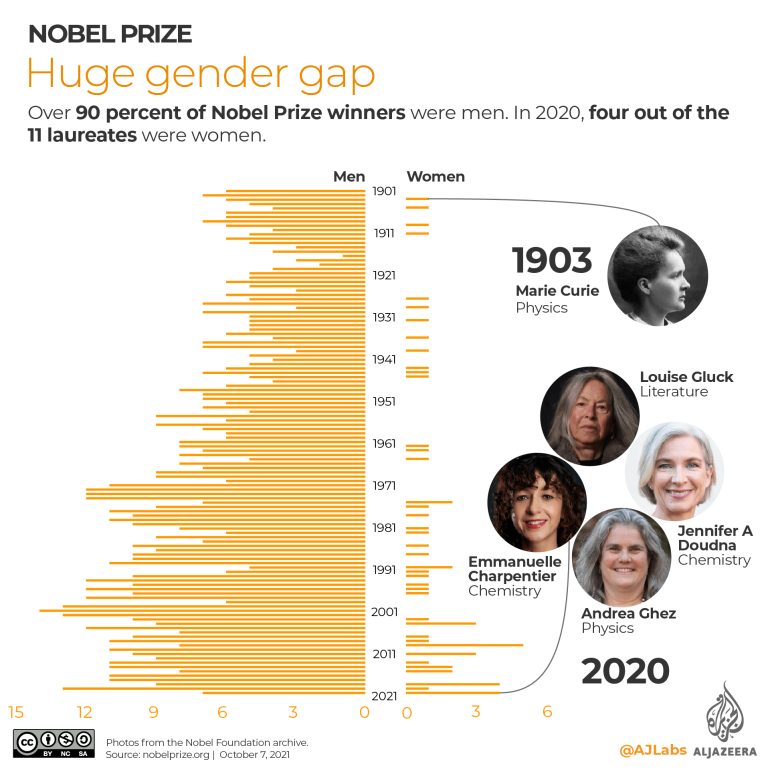Nobel academy head rules out gender, ethnicity quotas for prizes
Goran Hansson says prizes must go to ‘those most worthy’ but laments historic lack of female Nobel laureates.

The head of the academy that awards Nobel Prizes in science has ruled out introducing gender or ethnicity quotas after this year’s Nobel laureates included only one woman, continuing a historic imbalance among recipients.
Göran Hansson, the head of the Royal Swedish Academy of Sciences, said on Monday that he regretted that there were “so few women Nobel laureates” but added the prizes must go to “those who are found the most worthy”.
Keep reading
list of 4 itemsNobel Prize in economics goes to ‘natural experiments’ pioneers
Q&A: Nobel Peace Prize winner Maria Ressa
Infographic: Nobel Prize winners 1901-2021
“We have decided we will not have quotas for gender or ethnicity. We want every laureate [to] be accepted … because they made the most important discovery, and not because of gender or ethnicity,” Hansson told the AFP news agency.
The Norwegian Nobel Committee has handed out 609 prizes to 975 laureates since they were first awarded in 1901.
Of those, 59 have gone to women, accounting for 6.2 percent of the total.
Investigative journalist Maria Ressa of the Philippines was the only woman honoured this year. She shared the Nobel Peace Prize with Russian journalist Dmitry Muratov.
Hansson, whose remit covers awards for chemistry, physics and economics, said the disproportionate lack of female prize winners reflects historic and persistent “unfair conditions in society”.
“There’s so much more to do,” he said, citing the scarcity of female professors in natural sciences across the world.
“We will make sure that we have an increasing portion of women scientists being invited to nominate. And we will continue to make sure we have women on our committees, but we need help, and society needs to help here.
“We need different attitudes to women going into sciences … so that they get a chance to make these discoveries that are being awarded.”
Hansson said that some progress had been made in recent decades, with the trend of female winners increasing, albeit from a “very low level”.

Last year, three women won prizes.
Emmanuelle Charpentier and Jennifer Doudna were jointly awarded the chemistry prize for their work in gene-editing technology.
Astronomer Andrea Ghez scooped the physics prize alongside two male scientists – Roger Penrose and Reinhard Genzel – for her research into black holes.
Ghez was the fourth woman to ever win the physics prize.
Other notable female laureates in recent years include Pakistani activist Malala Yousafzai, who was jointly awarded the Nobel Peace Prize in 2014, American writer Louise Glück, who received the 2020 literature award, and Chinese scientist Tu Youyou, who was handed the medicine prize in 2015 for helping to create anti-malaria medicine.
Marie Curie, awarded the physics prize in 1903, was the first female laureate. She was recognised again in 1911 with the chemistry prize.
She remains the only woman to have won multiple Nobel prizes.